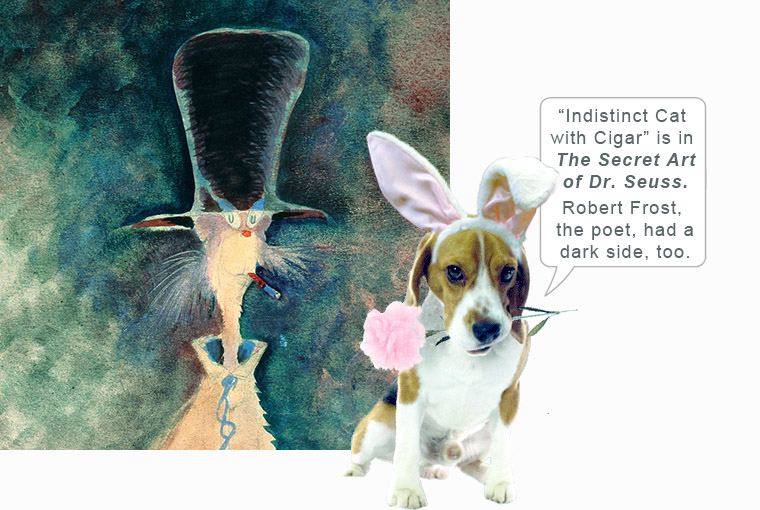
Robert Frost died when I was four, so we never met face to face, but throughout my formative years I spent an hour with him every night before I fell asleep.
Robert Frost taught me how to write.
If you will write like Robert Frost, you must approach your subject from an unexpected angle. Few things capture the attention like the unexpected. But when your listener has chosen to follow you on a journey, it is because they expect to be fascinated, intrigued, and delighted.
Don’t let them down.
Robert Frost knew that things can be used as metaphors for other things, which is why his poems often finish by making a powerful point we didn’t see coming. The dual nature of metaphors makes it easy to tell two stories at once.
In addition, Frost uses metaphors to lead us toward a destination, and then he allows us to joyfully discover it on our own. He doesn’t tell us what to believe; he just causes us to believe it.
Like every great radio ad, Robert Frost poems get better with every repetition.
Frost wrote “Fire and Ice” exactly 100 years ago after noticing the binary relationship between the hot and cold theories of earth’s destruction.
Some say the world will end in fire,
Some say in ice.
From what I’ve tasted of desire
I hold with those who favor fire.
But if it had to perish twice,
I think I know enough of hate
To say that for destruction ice
Is also great
And would suffice.
– Robert Frost (1920)
1. With his opening surprise of just 12 words he shows us the two possibilities known to every astrophysicist: (A.) our world could be burned up by the explosion of our sun, or (B.) we could perish in a coming ice age.
2. But then he makes a hard right turn to reveal that desire is just another type of fire, and hate is another kind of ice that for destruction “is also great and would suffice.”
Robert Frost opens our eyes to the destructive powers of greed and hate in 15 seconds, with just 51 words.
When you allow a person to arrive at their own conclusion, the truth you have communicated is no longer your truth, but their truth, and no one will ever be able to take it away from them. They will forever defend it as a product of their own observation.
1. Approach your subject from an unexpected angle.
2. Tell two stories at once, using the relationship between two things as a pattern to reveal the relationship between two other things.
3. Allow the listener to arrive at their own conclusion.
These are the principles of Chaotic Ad Writing as taught by Wizard Academy.
Chaos in science is not randomness but its opposite, a higher level of order beyond the scope of our immediate awareness. In the words of chaotic novelist Tom Robbins,
“Everything in the universe is connected, of course. It’s just a matter of using imagination to discover the links, and language to expand and enliven them.”
But Robert Frost knew this before Tom Robbins was born.
And Robert Frost taught it to me.
Shall we put it to the test?
STEP ONE: I have chosen the word “Molokai” to be our unexpected beginning.
STEP TWO: Send me a link to the website of a product or service for which a radio ad could not possibly begin with the word “Molokai.” roy@wizardofads.com
STEP THREE: I will randomly select five of these products or services and write a fascinating radio ad for each of them beginning with the word, “Molokai.”
STEP FOUR: These five ads will be published in the next issue of Radio Ink.
The objective of this demonstration will be to show you how “everything in the universe is connected, of course,” and how you can leverage these connections to accomplish things you have never been able to accomplish before.
I would happily tell you “what kinds of things” but when you have seen this technique demonstrated five times, you will come to your own conclusion. The connectedness of everything around you will no longer be Robert Frost’s truth, or Tom Robbins’ truth, or my truth, but your truth, and no one will ever be able to take it away from you.
Robert Frost won the Pulitzer Prize 4 times and was nominated for the Nobel Prize a record 31 times. Had he chosen to become an ad writer, he could have helped thousands of business owners achieve their dreams and become one of the wealthiest men on earth.
Roy H. Williams